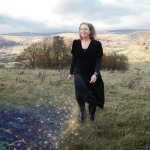Tim Peake is a former Apache pilot, test pilot and astronaut. Tim attended Chichester High School for Boys before joining the Army Air Corps as an officer. A veteran of 18 years’ military service, Tim has flown more than 3,000 hours in over 30 different types of helicopter and fixed-wing aircraft. Justin Chandler reports.
BRITISH astronaut Tim Peake will be at Buxton Opera House with his latest tour – Astronauts: The Quest To Explore Space – on Tuesday, September 23,
Tim made history in 2015 when he became the first British astronaut to visit the International Space Station (ISS), where he spent six months living and working in space, completing a spacewalk and even running a marathon.
And now he’s looking forward to a potential return to space, as part of a commercially-sponsored UK mission which could see him return to the ISS.
His latest tour brings to life the adventures of astronauts and gives a fascinating insight into what lies ahead. “It’s like the greatest hits of space exploration, with amazing footage and behind the scenes stories of what it’s really like to leave our planet,” Tim said. “There are around 650 people who have been into space – and this tour allows me to share some of their many amazing stories.
“I am so honoured to have experienced the wonders of space travel myself, and yet it still continues to amaze me just how much space inspires and fascinates people of all ages – and the show’s Q&A section proves that every single night. I love that part, but it’s also slightly terrifying as you never know what people are going to ask.”
While the tour reflects on space stories from the past, Tim is also focused on his own possible future exploration. The UK Space Agency was approached in 2023 by Axiom Space – a US-based company offering commercial space travel, which is currently working on the first commercial space station as a replacement for the ISS – to support their ambitions for an all-UK mission.
This short-duration mission would be focused on scientific research, technology demonstrations and educational outreach, with potential applicants having already been invited to pitch research projects for the mission.
“Axiom’s project is hugely exciting and I’m delighted to be involved,” Tim said. “Would I like to go back to the ISS if there was a chance with Axiom? Absolutely – I don’t know of any astronaut who wouldn’t want another mission to space.
“I am also delighted that we are looking to get more British astronauts their wings.”
The Axiom Space mission will be the first commercially-sponsored space flight, meaning no cost to the UK taxpayer, and it’s hoped it will open doors to further commercial partnerships and whet the appetite for space sponsorship in the future.
“Space touches all our lives in many different ways, from climate monitoring, communications, and navigation to financial transactions, agriculture and disaster response.”
“Space touches all our lives in many different ways, from climate monitoring, communications, and navigation to financial transactions, agriculture and disaster response,” Tim explains. “Most companies are reliant on some form of space-based technology today and there is huge scope for private investment.”
Tim retired from the European Space Agency (ESA) early in 2023, but within months talk had started around the Axiom mission.
“I retired from ESA as it was a time we needed to focus on having a stable family base – my sons were approaching their exam years,” Tim explained. “We had some amazing years in Germany and Houston, but the time had come to settle in the UK for a while.
“Working for ESA is an incredible experience. Retiring from their astronaut corps enabled me to do more advisory work, more charity and outreach work and to engage with the commercial space industry. However, I’m still an ambassador for ESA.”
Tim’s passion around all things space as well as STEM education (science, technology, engineering and maths) shows no sign of waning, especially given the expansion of commercial space exploration alongside the government-led agencies such as NASA, ESA and UKSA.
“The prospect of an all-UK mission is a hugely exciting opportunity for science and technology companies, and for education and outreach,” he adds.
“The impact of my ESA mission in 2015 was reaching and engaging with 2million schoolchildren, and with more Brits going to the ISS together, we can do even more.
So what does life look like now?
“An average week, if there is such a thing, sees me spinning a lot of plates!” Tim laughs. “I’ve had a dramatic career change once before when I went from being a test pilot to astronaut training and this has been a similar shift in focus.
“I’m an ambassador for The King’s Trust, Scouts, STEM Learning and Great Ormond Street Hospital, as causes very close to my heart, and I also work as an ambassador for the UK Space Agency and ESA for certain activities and events.
“I’ve recently also become an ambassador for King Charles’s Astra Carta initiative, looking at how we can use space sustainably and responsibly, so that we can all benefit from the opportunities space has to offer whilst protecting it for future generations.
“I’ve enjoyed writing several books, for both adults and children, and presented a TV documentary on the Secrets of Our Universe – and have especially enjoyed the opportunities to tour the country with my own shows!”
These are momentous times for the space industry. While a moonwalk is on the cards for the Artemis 3 crew in 2027, and work is ongoing towards a crewed mission to Mars, some of the most exciting work will have impacts much closer to home in the coming years.
“We have occupied the ISS for nearly 25 years now – and it is essentially a giant science lab,” Tim explains about the research taking place in orbit. “There are components in modern mobile phones which were first tested on the ISS.
“But we’re getting more specialist in the science taking place there now. There is more targeted pharmaceutical research. For example, growing protein crystals in space for motor neurone and Parkinson’s disease sufferers could lead to much better treatments for these conditions.
“We’re at the stage where space can become a manufacturing hub for all sorts of things, which can then be brought back down to earth.
“There are things you can build in space which can’t be built on earth, because of the effects of gravity, and with costs coming down we can also think about large scale manufacturing in space.
“There are attempts to grow human tissue and organs such as a heart on Earth, using bio ink and 3D printers. The problem is that small structures collapse due to gravity and need some sort of scaffolding. It’s not very effective. But in space, you can 3D print human organs more easily, because there is no gravity causing them to collapse in on themselves.
“It sounds like the wildest science fiction, but it really is science fact. Five to 10 years’ time, and we could be printing full-size human organs in space that could be a feasible transplant option for patients. And that’s when space research starts to mean something very real for people on Earth.
“The potential is only just now being unlocked.”
“Of course, there is the caveat question: Should we send lots of rockets up into space? When we think about the debris from launches and space pollution. But many space companies, some of whom I am working with, are also out there focusing on that clean-up effort, the removal of space debris and creating cleaner, more efficient rocket fuel.”
While all these prospects for the future of space travel are without doubt exciting, what most drives Tim’s enthusiasm is the power of inspiration.
Some of the scientists and engineers coming through now were teenagers inspired by his Principia mission – which has created a huge legacy for the British space industry.
“It’s easy to be inspired by space,” he said. “I can’t help but be inspired still by the potential future opportunities.
“The legacy I’m most proud of from my mission is without doubt the inspiration for future generations. When I go to schools and colleges, it’s amazing to see older students saying ‘I remember watching you launch and you inspired me to go off and follow these subjects’.
“It’s a huge privilege to have a platform that allows you to inspire people. Space is a place where we can all wonder and dream.”
Editor’s Note: The September show starts at 7.30pm. To book tickets, go to buxtonoperahouse.org.uk or call 01298 72190.






